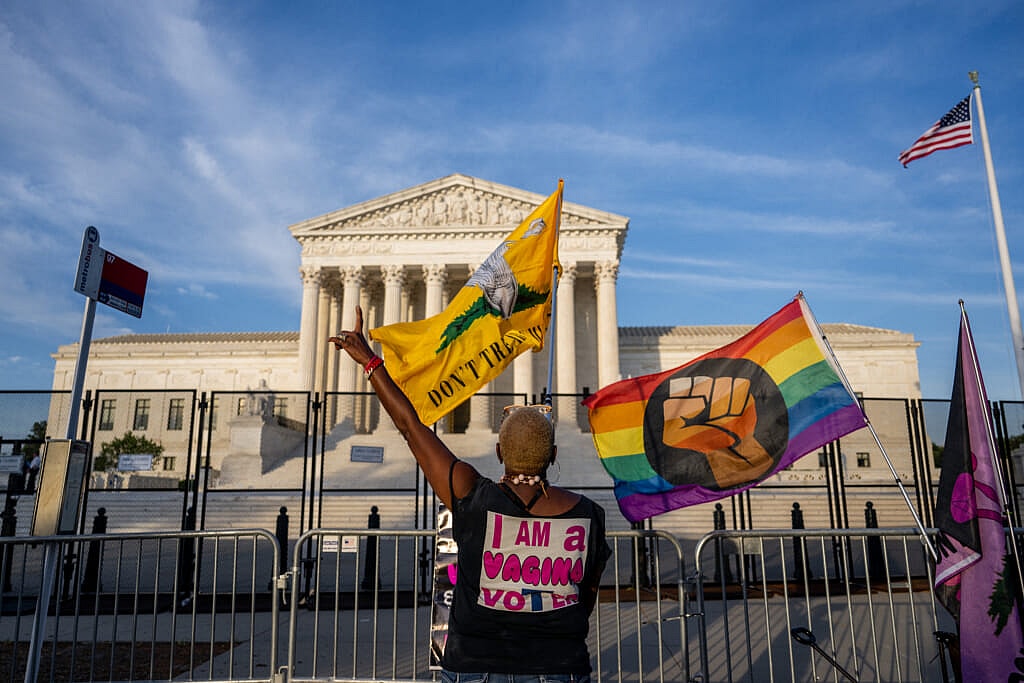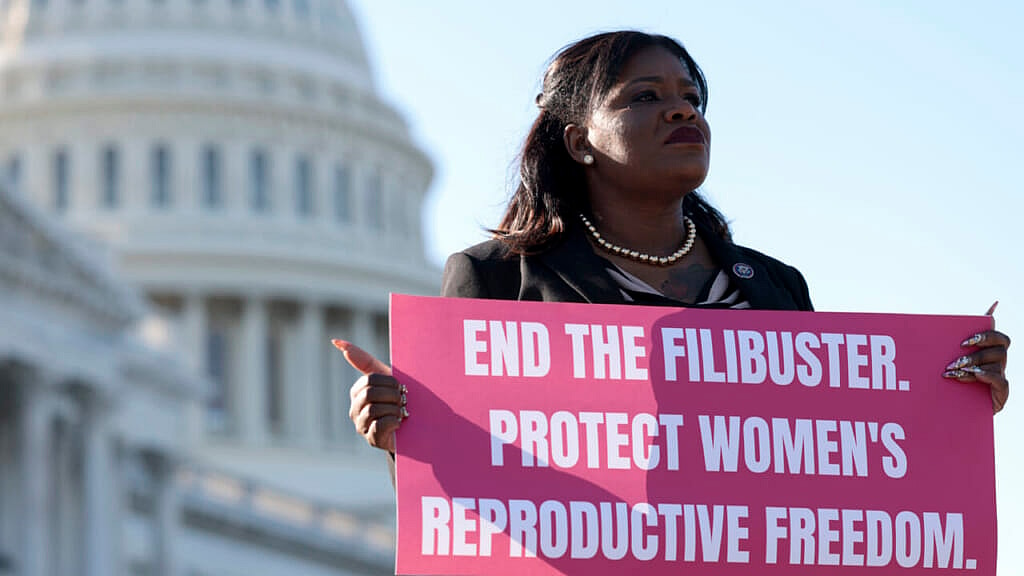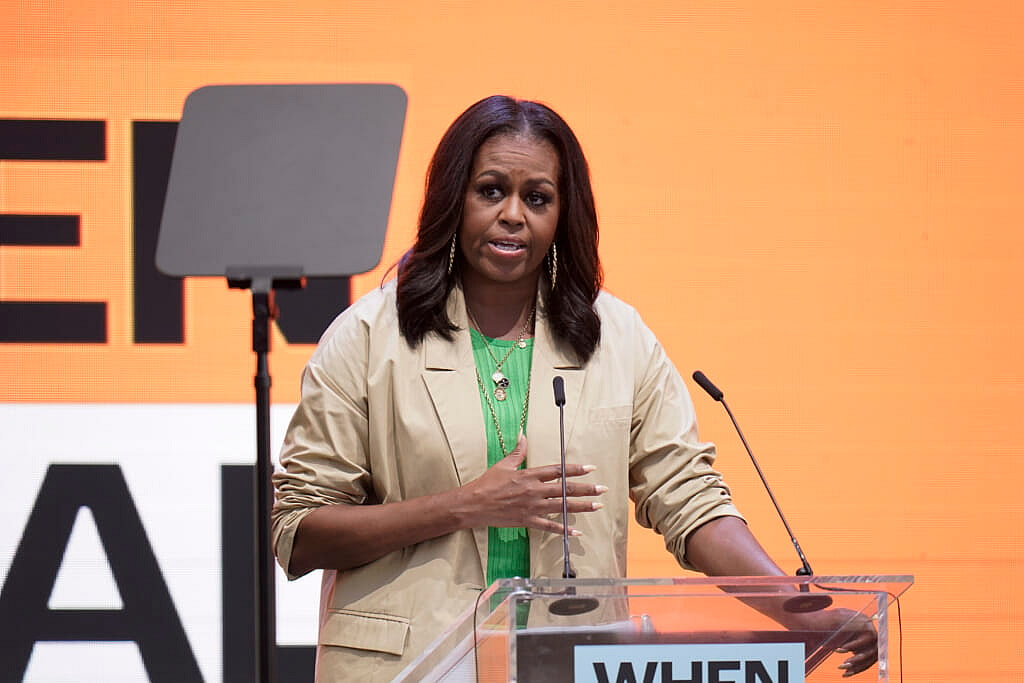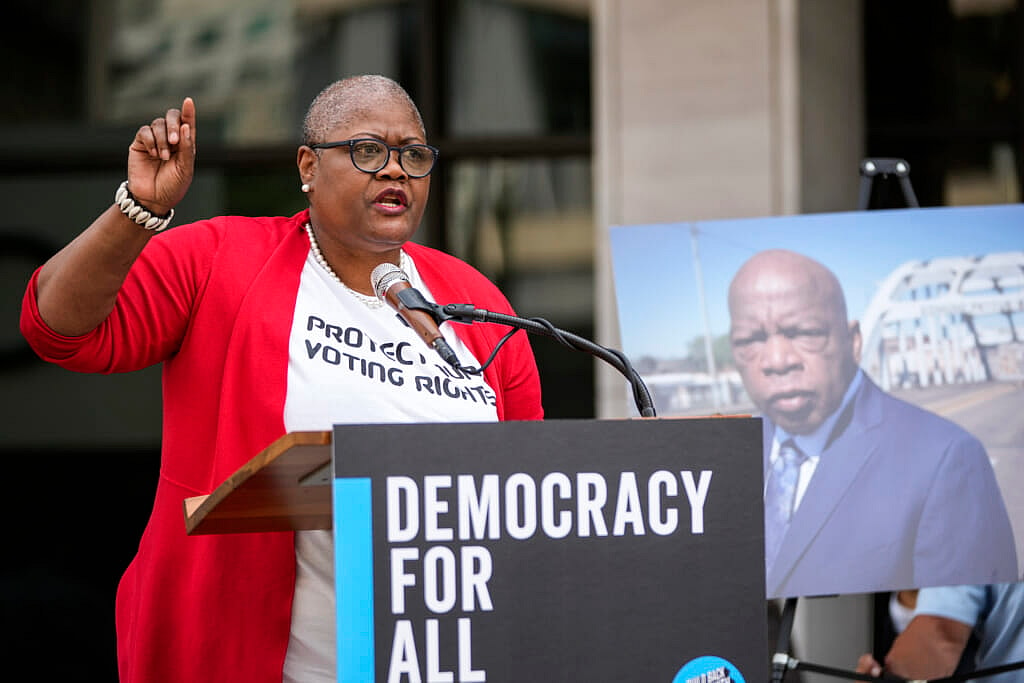Black women leaders are reacting swiftly to the Supreme Court ruling on Friday that overturned the right to an abortion with no exception for rape and incest.
The decision in Dobbs v. Jackson abolished the constitutional right to terminate an unwanted pregnancy, leaving women and birthing people in states where there are already restrictions – and those likely to enact restrictions or outright ban abortions – without a protected right afforded to them for nearly 50 years.

U.S. Rep. Barbara Lee (D-Calif.) told theGrio that the Supreme Court’s overturning of the landmark cases, Roe v. Wade (1973) and Planned Parenthood v. Casey (1992), marks a “very dangerous moment” in the United States.
Congresswoman Lee said she believes people will resort to drastic and unsafe measures now that the right to an abortion is no longer a constitutional right and will be restricted or banned in nearly half the states.
Lee shared her own personal decision as a teen to have a back-alley abortion well before Roe v. Wade. “It was a very difficult decision for me to talk about my abortion,” she told theGrio in a previous interview before Friday’s ruling.
Lee warned that Black women, who already have a hard time accessing adequate healthcare, will be most impacted by this unprecedented decision.
“I survived that back-alley abortion. Many women, especially Black women, did not,” said Lee. “And so now here we are 50 years later…I really worry about the return to unsafe abortions.”

Rep. Cori Bush (D-Mo.) told theGrio that the Supreme Court decision feels like she’s been “punched in the gut.” Bush ironically was at an abortion clinic with Health and Human Services Secretary, Xavier Becerra, when they received word about Roe v. Wade being overturned.
“I can’t understand the reality that I’m living in,” said Congresswoman Bush. “I cannot believe [it], even though so many of us, so many advocates, so many people working in this space, we knew that this was a possibility.”
Bush followed the lead of Congresswoman Lee by also sharing her personal story of having an abortion at 18. The Missouri lawmaker, who is also a minister, told theGrio that Lee “opened [her] eyes” when she shared her abortion story during a testimony at a House Oversight Committee hearing last year.
“When she talked about how prior to Roe v. Wade — prior to 1973 — the leading cause of death for Black women was the sepsis associated with those unsafe abortions — is our Supreme Court trying to send people back there? That’s OK to them?” said Bush.
Bush said she plans to fight back by sending her constituents seeking an abortion in Missouri to the neighboring state, Illinois, as she said her state plans to prosecute those who participate in what is now considered illegal abortion procedures. The congresswoman also plans to arm people with information about resources like the abortion pill and other means to thwart the court ruling that she said will harm “36 million people in this country.”

“We will fight and we will continue to do the work to make sure that everybody that needs care will get care,” Bush told theGrio.
Lee and Bush joined 18 other Black women members of the Congressional Black Caucus (CBC) in a signed letter to President Joe Biden, urging him to declare a public health and national emergency just hours before the Supreme Court’s ruling. The letter said that the overturning of Roe would “exacerbate multiple public health crises disproportionately impacting Black communities.”
“The effects of this decision on the lives and health of Black women and pregnant people will be devastating and require an urgent and whole-of-government response,” said lawmakers that included CBC Chair, Rep. Joyce Beatty (D-Ohio), Rep. Ayanna Pressley (D-Mass.), Rep. Ilhan Omar (D-Minn.) and Rep. Karen Bass (D-Calif.).
Moments after the decision came down from the Supreme Court, former first lady Michelle Obama released a statement saying that she was “heartbroken that we may now be destined to learn the painful lessons of a time before Roe was made law of the land.”

Mrs. Obama lamented over “a time when women risked losing their lives getting illegal abortions” and “a time when the government denied women control over their reproductive functions, force them to move forward with pregnancies they didn’t want, and then abandon them once their babies were born.
She added, “That is what our mothers and grandmothers and great grandmothers lived through, and now here we are again.”
Black women leaders from the activist community are sounding a unified call to fight back. Karen Boykins-Towns, the vice chair of the National Board of the NAACP, told theGrio, “we’re not going to take this sitting down and we will fight. We will fight. We will fight in the states.”
Boykin-Towns said it’s imperative that civil rights organizations “working in coalition” to protect a woman’s right to choose. She added that lawsuits will be filed to “protect women, protect Black women, protect poor women, protect women who should have agency over their bodies.”
Melanie Campbell of the Black Women’s Roundtable is equally as determined to fight, telling theGrio, “I’m mad as hell.”
Campbell reminded that this November there will be midterm elections–a reminder that elections have consequences. “We have to keep our eyes on the prize and it hopefully shows people the importance of why elections matter,” said Campbell. Referring to the conservative justices appointed to the Supreme Court by former President Donald Trump, she added, “three of those people shouldn’t even be there.”

Alencia Johnson, democratic strategist and chief impact officer at 1063 West Board — who worked at Planned Parenthood for six years — lambasted the “politicized” high court that she said, “cares nothing about poor folks, people of color, women, queer and trans people, and so many other marginalized communities.”
Johnson told theGrio that she worries that Black women will now be criminalized for deciding to get an abortion. She also fears that Black women will be left in “worse economic positions” and “unhealthy conditions.”
“It’s going to take more than voting out extremist anti-abortion politicians and shifting the court to change this outcome for the future,” added Johnson. “We’ve got to engage a culture change strategy that effectively humanizes Black women’s experiences and reduces the stigma that too many ‘pro-choice’ electeds have allowed to scare them from fighting with every tool they have to protect and advance the right to abortion.”
Johnson said she is “tremendously scared” for what lies ahead, but expressed her optimism that Black women will use their voices and political power to push back against the Supreme Court’s ruling.
“Even in our oppression, we’ll be the ones on the frontline organizing for new rights,” she said. “Maybe the left and Democrats will let the ones closest to the pain lead with an organizing strategy that can win in the future.”
TheGrio is FREE on your TV via Apple TV, Amazon Fire, Roku and Android TV. Also, please download theGrio mobile apps today!

